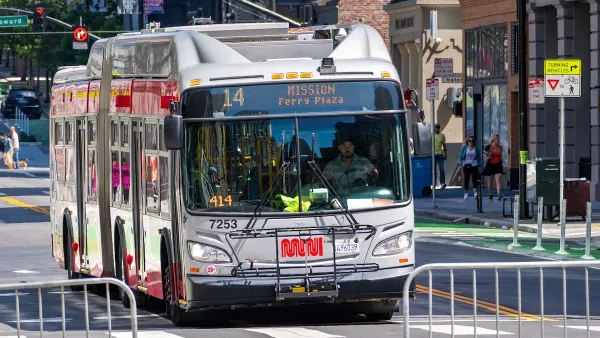A city law enacted in 2006 was intended to protect San Francisco's independent stores from the spread of chain - or 'formula' - stores. Stacy Mitchell explains the gaps in the current law and the efforts of one city Supervisor to tighten it.
While "No other large American city has done as much to check the spread of chain stores as San Francisco," enduring fears that an influx of chain stores will "erode the city's distinctive character" and "weaken its economy" have some concerned leaders, like Supervisor Eric Mar, who chairs the city's Land Use and Development Committee, looking into ways to tighten the city's formula business policy.
So what about the law isn't working? "While the law has deterred some formula businesses from applying and blocked permits for others," writes Mitchell, "dozens have either won approval in neighborhood business districts or opened in areas of the city not included in the policy. Target, for example, has been granted a permit to open a store in one neighborhood business district and has another in the works in a zone not covered by the policy."
According to Mitchell, Mar plans to introduce legislation in the coming months to address some of the perceived loopholes. "He envisions adding new criteria for large formula businesses that would take into account their large market areas and include a comprehensive economic impact review. He also wants to expand the law to cover more of the city's commercial districts."
"Mar has already helped fix one part of the policy that has long vexed some neighborhoods: branches of big banks are not counted as formula businesses. In June, the Board of Supervisors passed Mar's measure to bring banks under the policy, much to the relief of people living in areas where Chase and Bank of America have opened dozens of branches, leaving less space for other types of stores."
Thanks to smitchell
FULL STORY: How San Francisco is Dealing With Chains

Planetizen Federal Action Tracker
A weekly monitor of how Trump’s orders and actions are impacting planners and planning in America.

Maui's Vacation Rental Debate Turns Ugly
Verbal attacks, misinformation campaigns and fistfights plague a high-stakes debate to convert thousands of vacation rentals into long-term housing.

Restaurant Patios Were a Pandemic Win — Why Were They so Hard to Keep?
Social distancing requirements and changes in travel patterns prompted cities to pilot new uses for street and sidewalk space. Then it got complicated.

In California Battle of Housing vs. Environment, Housing Just Won
A new state law significantly limits the power of CEQA, an environmental review law that served as a powerful tool for blocking new development.

Boulder Eliminates Parking Minimums Citywide
Officials estimate the cost of building a single underground parking space at up to $100,000.

Orange County, Florida Adopts Largest US “Sprawl Repair” Code
The ‘Orange Code’ seeks to rectify decades of sprawl-inducing, car-oriented development.
Urban Design for Planners 1: Software Tools
This six-course series explores essential urban design concepts using open source software and equips planners with the tools they need to participate fully in the urban design process.
Planning for Universal Design
Learn the tools for implementing Universal Design in planning regulations.
Heyer Gruel & Associates PA
JM Goldson LLC
Custer County Colorado
City of Camden Redevelopment Agency
City of Astoria
Transportation Research & Education Center (TREC) at Portland State University
Jefferson Parish Government
Camden Redevelopment Agency
City of Claremont




























